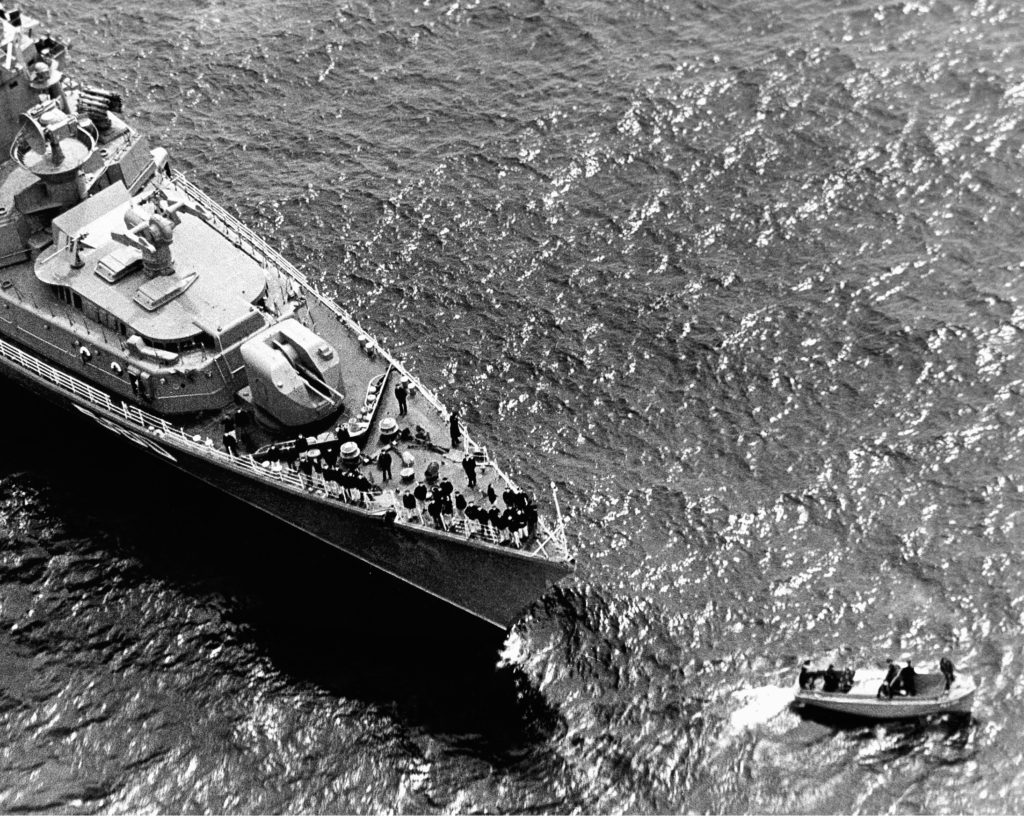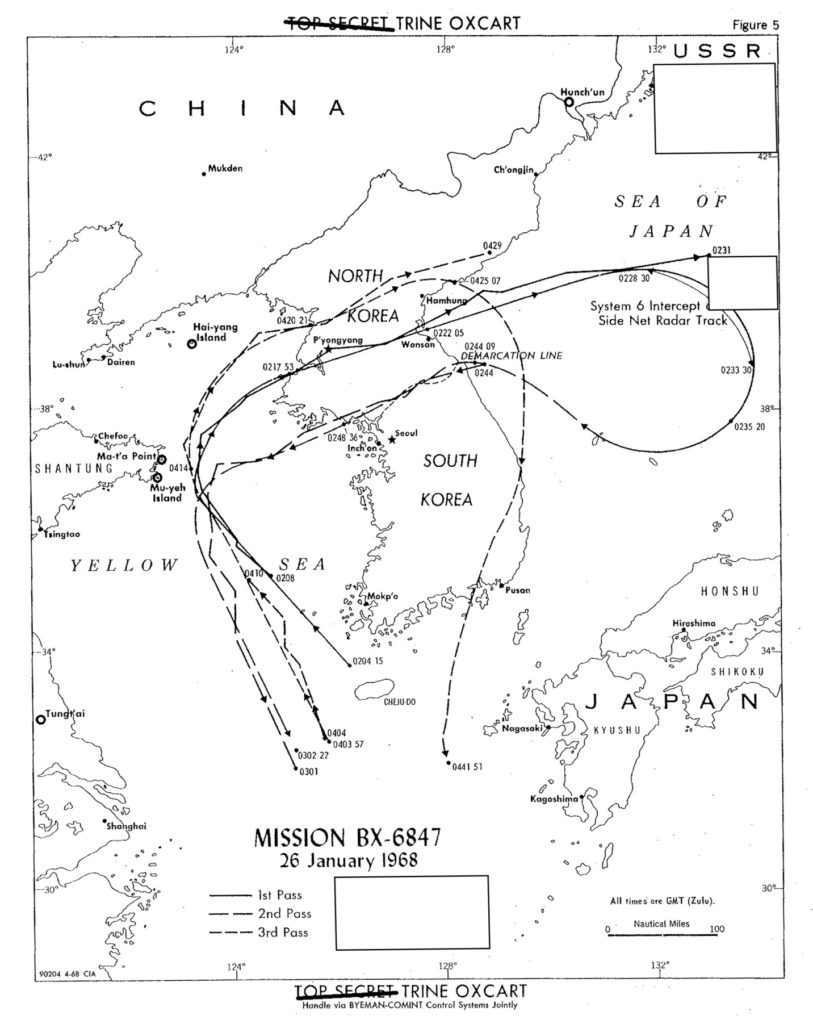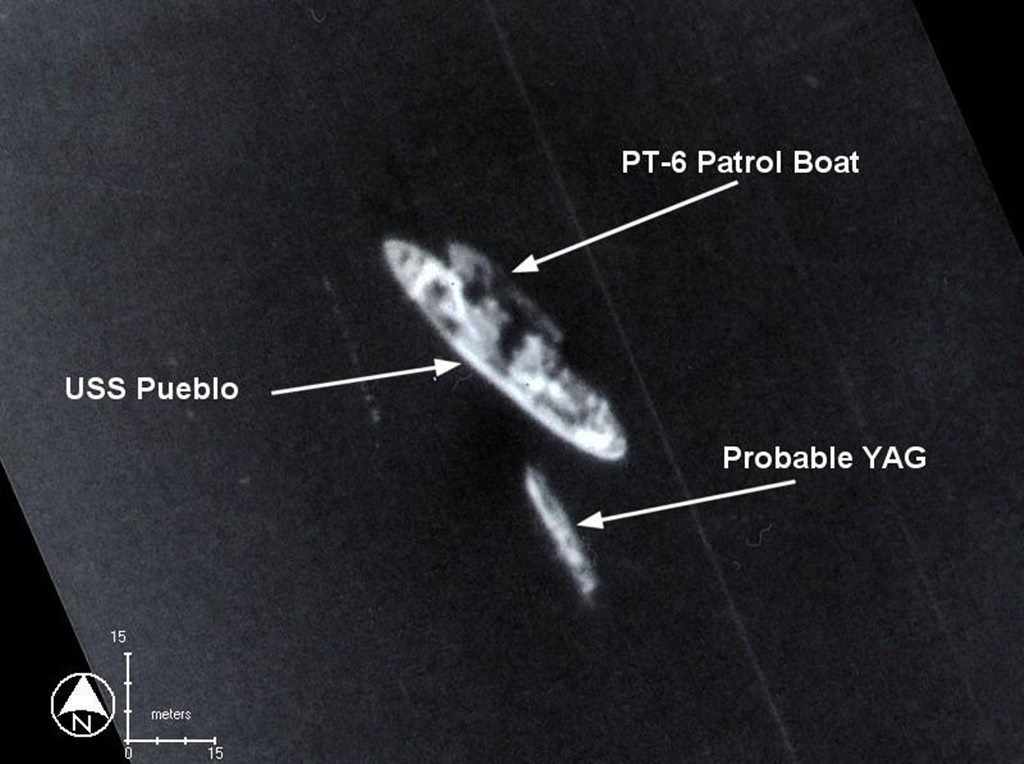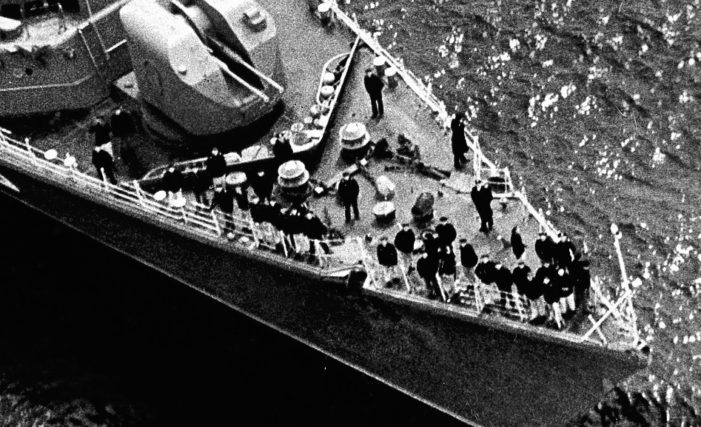Not since the British boarded the USS Chesapeake off the coast of Virginia in 1807 had an American Naval commander surrendered his ship in peacetime.
The ship was the USS Pueblo (AGER-2), a 177-foot Technical Research Ship (TRS) with a crew of 83 officers and men. It was seized in international waters off the coast of North Korea on January 23, 1968. The ship’s captain was Commander Lloyd M. “Pete” Bucher, and his superior officer, with headquarters in Japan, was Rear Admiral Frank L. Johnson, USN. The President at the time was Lyndon Bayes Johnson.
At the time of the seizure, the Pueblo was disguised as a hydrographic vessel of the AGER (Auxiliary, General Environmental Research) type. Along with $1.5 million USD (about $10.9 million USD in 2019 dollars when adjusting for inflation) in highly-classified SIGINT (signal intelligence) cryptographic equipment, the Pueblo also carried hundreds of pounds of U.S. Navy, Naval Security Group (NSG), National Security Agency (NSA), and other documents; also on the spy ship was a position devoted to monitoring Soviet telemetry. The Pueblo was spying mainly on North Korean radar and the Soviet fleet.

One crewman died, and several others were wounded, when North Korean gunboats opened fire on the lightly-armed reconnaissance ship. After eleven months of sometimes brutal detention and an American confession that was quickly disavowed, the crew was released, along with the body of Fireman Duane Hodges, USN.
During Richard M. Nixon’s 1968 presidential campaign, he swore there would never again be a “Pueblo Incident.” Five months after election day, however, President Nixon faced his own North Korean crisis, when, for the second time in fifteen months, a small, isolated North Korea, which Nixon had described as a “fourth-rate power,” attacked a U.S. Navy EC-121 spy plane, killing everyone onboard.

On April 15, 1969, North Koreans celebrated the birth of Kim Il-sung, the leader and found of the “Hermit Kingdom.” Birthday cheers were quickly replaced by the familiar shouts of “Down with U.S. imperialism” and “Liberate the South” when it was announced that MiG fighters had shot down a U.S. Navy EC-121 spy plane which North Korea claimed had intruded into its airspace. The shootdown, by one or two air-to-air missiles, took the lives of 31 Americans. Some of the debris also had what was reported as “shrapnel holes.”
Due to the EC-121’s proximity to Vladivostok, USSR, the main naval base of the Pacific Fleet in the Soviet Far East, the first vessels on the scene were Soviet; so the Nixon administration requested Soviet assistance to locate debris and possible survivors. This four-day joint U.S.-Soviet search and rescue operation became a rare example of cooperation between traditional Cold War adversaries. In Air Reservist (magazine), the official publication of the Air National Guard and Air Force Reserve, the Russians were described as “improbable allies.”

One of the first Soviet vessels to arrive was the Steregushchiy, a large anti-submarine (ASW) ship; another was the Soviet destroyer Vdokhnovennyi. A lengthy version of this story, which will appear under the title “Improbable Allies,” relies heavily on the first-hand accounts of three Russian sailors aboard the Vdokhnovennyi, including Felix Gromov, the ship’s executive officer. Later, Admiral Gromov became the Commander-in-Chief of the entire Russian Navy! For the Silo, by Bill Streifer.
Bill Streifer is a freelance journalist on North Korean history and related topics. His co-author, Irek Sabitov, is a journalist and former newspaper editor in Ufa, Russia. Their article on the subject will appear in the Autumn 2019 issue of the U.S. Navy War College Review. He is also the only American on the Editorial Board of Vostok (“East” in Russian), a journal on the Orient, published by the Russian Academy of Sciences in Moscow. For the Silo, Bill Streifer.
More from Bill-
Editorial Board, Journal of Oriental Studies (Russian Academy of Sciences, Moscow)Editorial Board, Journal “Vostok“
https://independent.academia.edu/BillStreifer
https://www.researchgate.net/profile/Bill_Streifer2


Leave a Reply
You must be logged in to post a comment.